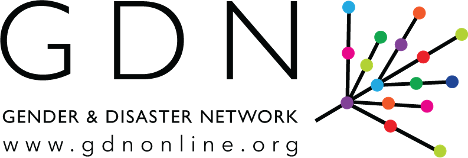Mary Fran Myers Gender and Disaster Award
As co-director of the Natural Hazards Center, Mary Fran Myers recognized that disaster vulnerability is influenced by social, cultural, and economic structures that marginalize women and girls. The Natural Hazards Center and the Gender & Disaster Network established the Mary Fran Myers Gender and Disaster Award in 2002 to honor women and men whose advocacy, research, or management efforts have had a lasting, positive impact on reducing disaster vulnerability. Award winners, both individuals and organizations, have contributed to gender and disaster knowledge or furthered opportunities for women to succeed in the field.
The final Mary Fran Myers Gender and Disaster Award was awarded to the Gender & Disaster Network in 2022. As we close this award opportunity, we would like to extend our thanks to those who have assisted with the award administration and selection for the past 20 years, as well as our deepest gratitude to those who embody the spirit and advance the work of Mary Fran Myers.
2022 Winner
Gender & Disaster Network

The 2022–and final–recipient of the Mary Fran Myers Award is the Gender & Disaster Network (GDN). Established in 1997 at the Natural Hazards Workshop, GDN has grown into a global network of educators and advocates interested in gender relations in disaster contexts.
On July 16, 1997, Barbara Vogt convened the “Women’s Disaster Research Caucus,” which planted the seed for GDN. GDN’s initial mission asked how to network more effectively, promote young women professionals, promote women and gender issues as vital research topics, and use web-based resources for communication. Since its founding, the mission of GDN has expanded to include a broad range of goals, which it promotes and advocates for to this day.
GDN’s goals align with the diverse history of the Mary Fran Myers Award winners, which includes people from around the world who build community and scholarship through research, activism, policy development, and network-building. The goals of GDN include:
- Documenting and analyzing people’s experiences before, during, and after disasters, situating gender relations in broad political, economic, historical, and cultural contexts;
- Working across disciplinary and organizational boundaries in support of collaborative research and applied projects;
- Fostering information sharing, resource building, and networking among members;
- Building and sustaining an active international community of scholars and activists;
- Advocating for change and evidence-based policy and practice at all levels.
GDN developed and maintains a database of continually updated works of literature on gender relations in disaster contexts. This library relies on the work and dedication of volunteers committed to the mission of GDN. Additionally, GDN published two volumes in a series of reference guides on gender and disaster. The first volume includes essential readings for an introduction to readers and researchers who may be new to studying gender and disaster. The second compiles references to several essential pieces on gender, disaster, and conflict, including themes on health, livelihoods, and rights.
GDN has partnered with Gender Responsive Resilience and Intersectionality in Policy and Practice (GRRIPP), which collaborates globally to exchange knowledge, bringing together theory and practice to promote gender-responsiveness in disaster management. In partnership with GDN, GRRIPP has developed a new digital magazine this year, Feminism & The City, which combines photography, poems, reflections, and more on feminism and the city.
GDN has also partnered with a number of other institutions and organizations to hold events, publish works, and build networks in the area of gender and disaster contexts. For example, GDN has partnered with the African Union and the African Risk Capacity Group to launch the Gender and Disaster Risk Management Platform. Additionally, they have participated in the World Conference on Disaster Risk Reduction (WCDRR), the Global Platform for Disaster Risk Reduction, the annual Natural Hazards Workshop, and other international conferences to promote and collaborate in the field of gender and disaster.
You can find more on the Gender & Disaster Network on their website.
To see a list of all previous winners, please click here: Award Winners
